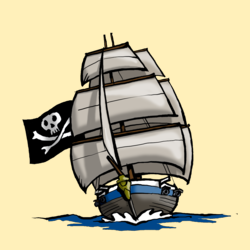 On this day 219 years ago, Fletcher Christian led a mutiny against Captain William Bligh on the Bounty, a ship owned by the Royal Navy. At the time the ship was near Tonga. Bligh and 18 others were crowded into the ship’s boat and set adrift, while Christian and 22 others stayed on the Bounty. Equipped only with a sextant and a pocket watch, Bligh successfully navigated the overcrowded ship’s boat on a 47-day voyage to Timor. The mutineers went to Tahiti where most landed, but Fletcher Christian and eight others, together with six Tahitian men and 11 women, set sail in the Bounty, eventually settling on Pitcairn Island and burning the ship.
On this day 219 years ago, Fletcher Christian led a mutiny against Captain William Bligh on the Bounty, a ship owned by the Royal Navy. At the time the ship was near Tonga. Bligh and 18 others were crowded into the ship’s boat and set adrift, while Christian and 22 others stayed on the Bounty. Equipped only with a sextant and a pocket watch, Bligh successfully navigated the overcrowded ship’s boat on a 47-day voyage to Timor. The mutineers went to Tahiti where most landed, but Fletcher Christian and eight others, together with six Tahitian men and 11 women, set sail in the Bounty, eventually settling on Pitcairn Island and burning the ship.
A number of lessons arise from the aftermath of the Bounty mutiny. Technical ability does not in itself make someone a good leader, as was demonstrated by Bligh’s subsequent poor performance as Governor of New South Wales. Shared hatred of a despotic leader is not sufficient to create a lasting alliance, as was discovered by the mutineers, most of whom subsequently died miserable deaths until some ten years later only one of the mutineers on Pitcairn Island was still alive.
An organisation birthed in conflict and lawlessness rarely has an opportunity to flourish, as has been demonstrated by the subsequent history of Pitcairn Island. Over the past 200 years Pitcairn Island has remained a small settlement populated almost exclusively by descendants of those who arrived on the Bounty. The Island has had a long history of child sexual abuse and in 2004 a number of the men on the island were convicted of sex crimes and jailed.